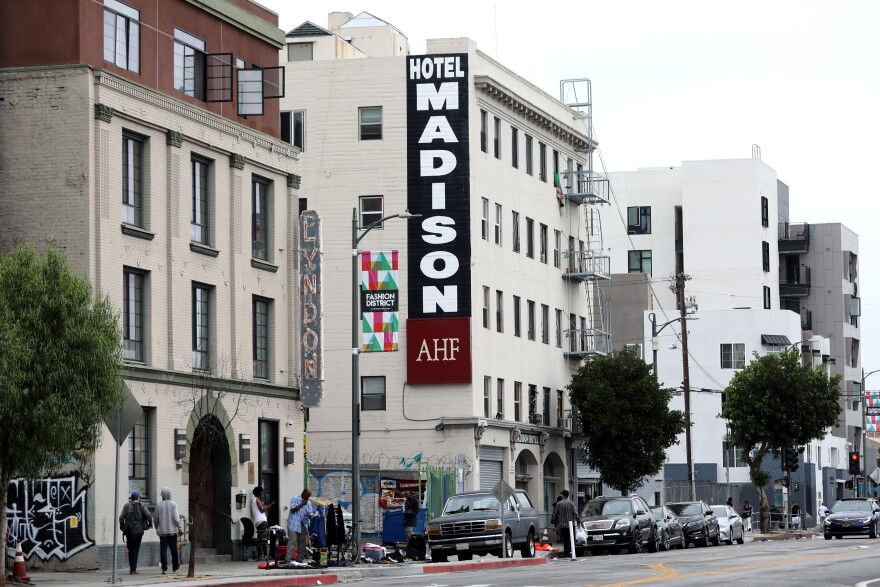A major player in California politics has reached a settlement with tenants who sued over conditions in a Skid Row apartment building. That agreement was announced just as opening statements were set to begin Monday.
Renters at the Madison Hotel first filed suit against the AIDS Healthcare Foundation (AHF) in March 2020, alleging the landlord had systematically failed to provide them with safe and habitable housing.
They said the building had routine pest infestations, severe safety hazards, water and power outages, a lack of on-site security and non-operational elevators.
What’s in the settlement
Under the agreement signed in court Monday by attorneys for both sides, AHF agreed to pay $575,000 to settle the class action lawsuit. Tenants are set to get back 25% of the rent they paid since AHF took over the building in 2017. The organization has also agreed to:
- Hire an elevator consultant within 60 days of the agreement
- Work with plaintiffs’ pest control experts to address bug infestations
- Provide third-party training for building staff
- Post information on who the building’s resident caretaker is
- Use only licensed contractors to fix issues in the building
As part of the settlement, plaintiff’s attorney Jennifer Kramer agreed to provide a statement to the effect of: “Plaintiffs acknowledge that AHF has invested significant resources into improving and upgrading the Madison which represents an effort to improve the conditions in L.A.’s Skid Row district.”
What AIDS Healthcare says
With a deal now reached, AHF president Michael Weinstein will no longer have to take the stand to answer questions about conditions at the Madison. His organization is currently backing California Prop. 33, a major statewide initiative to expand rent control.
Weinstein and AHF have faced criticism for bankrolling three separate attempts to overturn state-imposed restrictions on local rent control. Critics argue that campaign money could have instead been spent to improve conditions in their buildings.
Weinstein told LAist such criticism is unfair. “We have spared no expense in improving these buildings, but we have to look towards the bigger picture,” he said. “We need to look at how we can keep expanding the pool of affordable housing. And if we have rent hikes forcing people out on the street, we're never going to solve the problem.”
Weinstein said the Madison, which is now 100 years old, is an old building with problems that pre-date AHF’s ownership. “We have spent $7 million improving the building,” he said. “The rent there is $400 a month. There are no rents lower than that anywhere in Los Angeles.”
Why did a settlement take more than four years?
The tenants’ attorneys said the terms of the settlement will greatly improve the lives of impoverished renters living at the Madison.
Outside the courthouse, Kramer said, “I felt like we got for the tenants something as good — possibly better, who knows — than we would have gotten at trial.”
Kramer said the timing of the settlement coincides with a busy election season for AHF.
“I could only speculate on their part, but I couldn't believe that they would want this trial to go forward, given what's happening with the initiatives that they're involved in,” Kramer said.
AIDS Healthcare Foundation had previously settled cases specifically tied to elevator failures at The Madison for hundreds of thousands of dollars.
And the group is still facing a separate case from tenants living at The Baltimore, another of their Skid Row properties.
Single-room occupancy buildings such as the Madison and the Baltimore have long been challenging to operate. These properties have historically provided bare-bones bedrooms — kitchen and bathroom facilities are commonly shared — to some of the city’s lowest-income residents. The owners of a similar Skid Row building, the Cecil Hotel, say they’re operating at a financial loss due to high security and maintenance costs.











